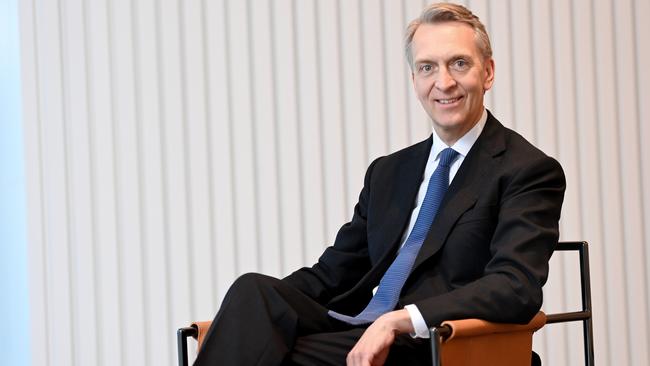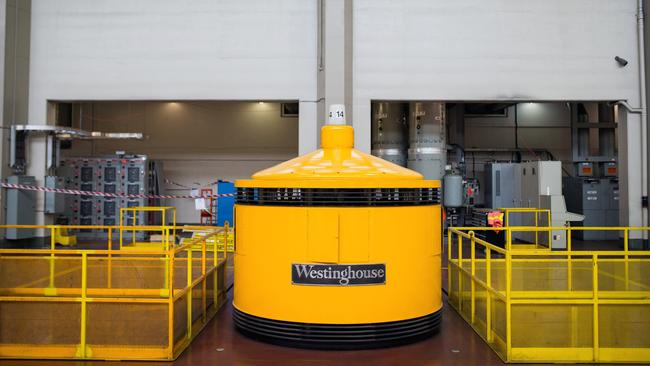Brookfield chief Bruce Flatt says Australia ticks all investment boxes

Over 30 minutes, Canada’s Warren Buffett reveals how strategic reshoring of semiconductors, the rout in the tech market and energy transition all present investment plays for Brookfield – and how Brookfield’s commanding position in nuclear technology will solve the problem of long-term battery storage.
Flatt is joined by Stewart Upson, Brookfield’s key man in Sydney who led the successful takeover of transmission business AusNet and the bid for gas giant AGL – which is unfinished business.
Upson is also coy about Brookfield’s interest in the 64 per cent stake in Australia’s TPG Telecom, shares which are released from escrow in mid-July.
Brookfield has $75bn invested locally – so far. There are transmission lines, railways, power plants, construction businesses, data centres, real estate and ports.
Globally, the firm manages more than $1 trillion of investments. The corporation also owns $75bn of investments accumulated over the past 30 years, and it owns an asset manager.
Asked what he thought of a market hit by supply chain carnage, energy shortages and rising inflation, Flatt says it depends: for Brookfield it does not matter very much because a cross-border transfer of goods is not relevant to most of its business investments.
“As long as you have a proper country to invest in, you get a return on your capital and you can sell an asset and buy assets. We have a list of things that we want when we go into a country. Australia fits that list and still fits it 20 years later,” he says.
That simple rule, guiding investment to 30 countries, probably accounts for why Brookfield has avoided problems in Russia and Ukraine.
Brookfield shares – including dividends – have returned more than 2900 per cent since Flatt took over in 2002. That compares with 400 per cent for the S&P 500. It represents an annualised return of 18 per cent over 20 years.
One very important change Flatt sees is strategic reshoring for national security.
“Semiconductor chips: the plants are coming back to America and they’re coming back to Europe and they’re going to come to Australia and other places. We are talking $US500bn ($721bn) to trillions of dollars. We are working with one of the chip manufacturing companies to invest in infrastructure with them,” Flatt says. That company is Intel.
Brookfield’s reputation in energy transition is well known. But Flatt says that, for the first time in a long while, nuclear plants are back on the agenda.
In 2018 in a distressed asset buy (a signature move), the company acquired Westinghouse Electric from Toshiba. Toshiba had bought it from the energy-stressed British government in what now seems a tragic miscalculation.
Flatt says Westinghouse is one of four nuclear companies in the world, the other three being owned by Russia, China and India. “We have 12,000 engineers and the AP1000 technology. And an amazing small nuclear battery technology, of one, three or five megawatts. This is the key to battery storage,” he says.
If Flatt is right, the technology could turbocharge global energy transition away from coal.
As inflation takes hold, Flatt says the Brookfield portfolio is resilient. “We’re not in the heart of where the correction is. We’re in real assets. They’re inflation-protected. It’s pretty good times for the things that we own.”

He says Brookfield was not distracted by the action in the tech sector over the past three years. Now is the time to move.
“Some technology stocks are off 80 per cent. Is there another opportunity out there for stress?” Flatt says. “There will be a technology business that we will be able to add into the fold at valuations which meet our metrics that we adhere to.”
Over 10 years, Brookfield has built a huge renewable energy portfolio. In 2020, Flatt brought in fellow Canadian Mark Carney, a climate change champion who had just stepped down as governor of the Bank of England. The firm has just closed a $US15bn transition fund, the largest in the world.
In January, Upson led the $18bn takeover of AusNet, which owns the Victorian electricity transmission and gas and electricity distribution networks.
“The risk of interest rates and inflation was to the upside and regulated businesses are positively exposed to higher rates of higher inflation. And we saw a huge opportunity to build the extensions that are required to make that renewable electrification,” Upson says.
The federal government’s Powering Australia plan needs $58bn of private investment.
In the scramble for answers to the energy crisis, Flatt cautions on hard intervention in private markets.
“Over the longer term good countries will adopt the right policies. Yes, they may have to figure out how to facilitate bringing costs down for people, but it shouldn’t be borne by private investors,” he says. “Countries that make the right decisions attract capital and it lowers costs capital and therefore it’s good for the country.”
One distressed asset Brookfield has been eyeing is AGL, which could yet become a flagship transition story.
Despite a torpedo of the demerger by Mike Cannon-Brookes, AGL’s share price remains higher than when Brookfield joined forces with the activist investor in an attempted takeover.
Upson agrees the price shows the market believes Brookfield is still interested. “It’s clearly trading at a takeover premium price. It was $7 before the bid started and now it’s trading somewhere in the high eights,” he says.
“We have the largest pool of transition capital in the world. It’s uniquely placed to buy these sorts of businesses and help them get to where they need to be. And AGL is a perfect example of that.”
The relationship between Brookfield and Cannon-Brookes is unclear and Upson points to plenty of other opportunities for Brookfield capital.
“If Stewart and the team here bring us opportunities that meet our returns and our thesis we will put enormous amounts of money into good countries,” says Flatt.
TPG Telecom is one such opportunity. In July, 64 per cent of shares – belonging to David Teoh, Vodafone and Hutchison – are released from escrow. “We’ll have to see,” Upson says.
Brookfield sees value in property. Flatt says infrastructure investing has been highly sought after but people have been confused by real estate. In all the shutdowns and zero occupancies, they have misunderstood how well real estate has weathered the pandemic: “Real estate has a cloud on it because of what happened. When that clears it will be a highly, highly attractive asset class in a more inflationary environment.”
He says Brookfield continues to buy real estate assets at a fraction of the replacement cost (a replacement cost that is also rising with inflation).
This year Brookfield’s share price is down 24 per cent. But the chief executive is not phased, arguing that other than a few stocks, everything is off 20 per cent now.
Investors will see big changes this year, however. Until now, Brookfield has distributed dividends but retained capital to grow the business. That capital will remain with the business, but Brookfield also has its vast investment management business.
Brookfield plans to give 25 per cent of the management business to shareholders, leaving the company with the investments plus the remaining 75 per cent of the manager.
Flatt says realising more value in the market is a second-order issue. Investors who want exposure to the corporation will continue to invest but for those who want to invest in the manager, there is now a peer group in the asset management industry that has developed over 25 years.
“People can buy that manager security and that will create options for us that weren’t available as a 100 per cent-owned subsidiary,” he says.
Most striking about Brookfield is the scale of investment. Surprisingly, Flatt says it has strengths but also weaknesses. “Our business has been built on scale and that’s an enormous benefit. The weakness is we are in 30 countries with people all over the world. You have to deal with all those things that come with it. But on balance it has been a great thing.”
After more than three decades building Brookfield and two decades at the helm, Flatt, 56, has “no plans” to step back.



Bruce Flatt, the intriguing Canadian who runs giant alternative asset manager Brookfield, is back in Australia this week after a three-year pandemic-induced absence.